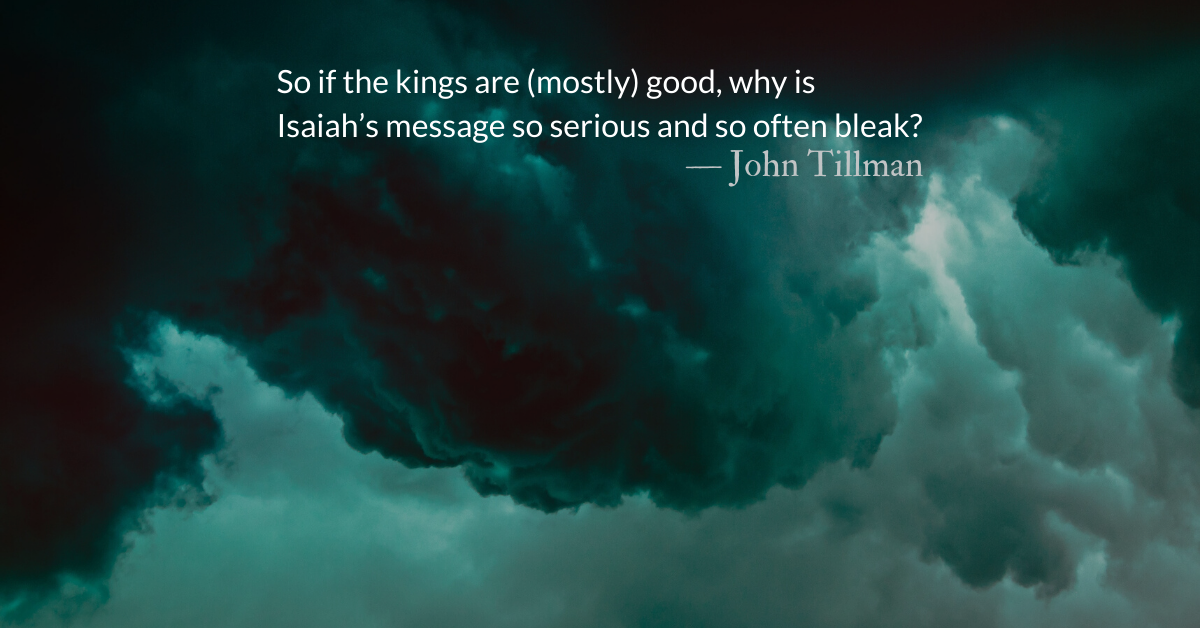Scripture Focus: Isaiah 2.4-5
4 They will beat their swords into plowshares
and their spears into pruning hooks.
Nation will not take up sword against nation,
nor will they train for war anymore.
5 Come, descendants of Jacob,
let us walk in the light of the LORD.
Isaiah 2.17-20
17 The arrogance of man will be brought low
and human pride humbled;
the Lord alone will be exalted in that day,
18 and the idols will totally disappear.
19 People will flee to caves in the rocks
and to holes in the ground
from the fearful presence of the Lord
and the splendor of his majesty,
when he rises to shake the earth.
20 In that day people will throw away
to the moles and bats
their idols of silver and idols of gold,
which they made to worship.
Reflection: The Sin Which Fells Nations
By John Tillman
Isaiah is filled with incredible contrasts.
Isaiah holds beautiful descriptions of the future God has for his people. Many of the most hopeful and uplifting promises of God can be found in the prophet’s words.
Isaiah also shows unflinching portraits of wrath. His pen does not shrink from descriptions of grim destruction that will eventually come to Judah and the terror that will strike the powerful when God destroys injustice.
We must remember both.
One might assume that these were bad times in Judah. Far from it. By most external indicators, it was the best of times. The land overflowed with gold, goods, horses, and chariots. (Isaiah 2.7) Isaiah served as prophet to four kings and only Ahaz is described as being overtly evil. Yet there was something rotten at the core of worship in this prosperous and powerful kingdom.
So if the kings are (mostly) good, why is Isaiah’s message so serious and so often bleak? A hint may be found in the downfall of two of those righteous kings. Hezekiah and Uzziah (Also called Amaziah) are among the great kings of Judah but each was felled by the axe of pride.
Hezekiah died knowing that his prideful display before the Babylonians would cause slavery and death for the generations following him. Uzziah’s prideful sin was greater and his fall was worse. He died alone, a leper, outcast even from being buried among the kings of Judah. These kings ended their reigns bearing the ignominy of consequences brought on by pride.
Even under good kings, sin (especially pride) brings ruin to nations. How much more so, under evil kings? How much more so beyond that, under evil kings who think themselves to be good?
From Isaiah we can learn that what looks like a great and powerful nation may actually be a spiritual wasteland of pride and greed and what looks like God’s faithful worshipers may actually be rebels entering the Temple with blood on their hands from the injustice they either ignore, support, or use to fuel their prosperity, which is their true god and idol.
May we flee pride and prideful leaders. May kings of the earth be of little consequence to us compared to the king of Heaven. May our worship be marked by humility, confession, contrition, and repentance. May the indicators that most matter to us be ones of spiritual import not financial or political.
Divine Hours Prayer: The Refrain for the Morning Lessons
Create in me a clean heart, O God, and renew a right spirit within me. — Psalm 51.11
– Divine Hours prayers from The Divine Hours: Prayers for Springtime by Phyllis TickleToday’s Readings
Isaiah 2 (Listen – 3:00)
Hebrews 10 (Listen 5:33)
Read more about Pride and Shortsightedness
The remarkable life of Hezekiah ends in pride and shortsightedness.
Read more about Pride and Cowardice
The separation of cowardice and pride is a false one, for these two are really one and the same.







